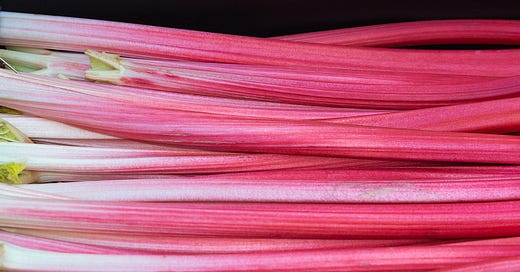Agriculture can be so weird! Please enjoy this story by Megan Moore. -Katherine

The Strange Habitat of Forced Rhubarb
By Megan Moore
For many, rhubarb is a tart delicacy really only enjoyed when paired with the likes of strawberry. But for the residents of the Rhubarb Triangle, this crop is anything but insignificant. In fact, it’s fawned over.
The Rhubarb Triangle is an area of Britain between Leeds, Wakefield, and Bradford in West Yorkshire, a Protected Designation of Origin by the European Union. Only 12 or so growers still produce this quirky plant, and it’s not called just rhubarb: it’s Yorkshire Forced Rhubarb.
The mysterious name comes from the growing method. Before it is cast into darkness, the plant receives a typical upbringing. It is grown in outdoor fields for around two years, where exposure to Britain’s winter frosts toughens up its roots. Rhubarb is ready to harvest about ninety days after the shoots first sprout in spring. But to grow tall and possess the prized stalks that measure around eighteen inches in height, the plant needs about two years of relatively warm weather: Temperatures greater than 41º Fahrenheit are required for the plant to emerge from dormancy. So the plant is ripped up from its soil home, but not to be sold. Instead, it is relocated to a forcing shed.
Hot and dark forcing sheds, traditionally heated by the coal that was prevalent in the area, encourage rapid growth. It’s said you can hear the hearty stalks squeaking and popping as they shoot skyward.
The forcing sheds serve two purposes. They are kept warm to facilitate plant growth. But they are also entirely dark. Contrary to what you might think about raising plants, the lack of light causes the rhubarb to grow steadfastly upward in search of sunlight. Artificial lights aren’t even used to illuminate the plants during harvest, which is done by hand. Growers opt for candlelight so as not to disturb the other still-growing crowns, keeping their shoots as soft as possible while preventing the photosynthesis that leads to bitterness. And the more pink the stalks, the more impressive on the dessert plate.

Popcorn with Dan Pashman
Agriculture and movie theatres, working together since the Depression - but at absolute odds before that.
Listen to Smart Mouth: iTunes • Google Podcasts • Stitcher • Spotify • RadioPublic • TuneIn • Libsyn • Amazon Music
Check out all our episodes so far here. If you like, pledge a buck or two on Patreon.
More Food Reading:
I told CNN what cookbooks people should buy.
Upscale restaurants with terrible food: so hot in New York right now.
A goofy vintage cookbook illustrated by Hilary Knight? Yes, absolutely.
If you liked the newsletter today, please forward it to someone who’d enjoy it, and tap the heart icon above or below, which will help me reach more readers. I appreciate your help, y’all!
This newsletter is edited by Katherine Spiers, host of the podcast Smart Mouth.
A TableCakes Production.
Want to contribute? Here are the submission guidelines.




Fascinating method of growing rhubarb!